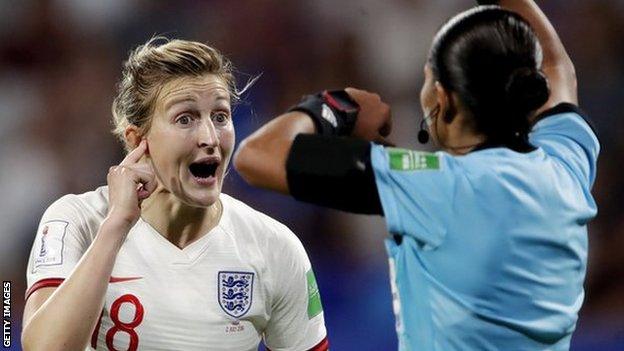Manchester United boss Casey Stoney does not want VAR in WSL
- Published

England's Ellen White saw a World Cup semi-final goal ruled out by a marginal VAR offside decision
Manchester United manager Casey Stoney says the Women's Super League "can spend our money on far better things than video assistant referees".
VAR is not used in any major domestic women's competition, including the WSL.
It was used in the 2019 Women's World Cup and there were controversial instances, including a disallowed goal for England's Ellen White in the semi-final against the USA.
"I don't like it. I like the drama of football," added Stoney.
"We aren't resourced for it for a start - we're lucky if we get one camera at WSL games, let alone 15.
"I like the fact that a referee makes a mistake because they're human and if I'm sitting in the crowd, I want to be able to celebrate a goal and not have to wait two minutes to see if it's onside or offside."
Stoney was a pundit for the BBC during the World Cup, which also saw France given a penalty re-take after VAR had ruled Nigeria goalkeeper Chiamaka Nnadozie had stepped off the goalline before saving Wendie Renard's first effort.
There were also controversial decisions during Scotland's 3-3 draw with Argentina which saw them fail to progress to the knockout stages.
"I thought we were going towards, years ago, the advantage for the attacker to make it a more entertaining game, but it seems to have gone completely the other way now," said Stoney, whose team are fourth in the WSL.
"I don't want it in the women's game at all and I don't think we'll ever see it because I don't think we'll ever be resourced for it because there's not the money in the game."
While Stoney is against the idea of VAR in women's football, she is keen to for the WSL to adopt goal-line technology, which was first introduced during the 2015 World Cup in Canada.
"That's black and white isn't it? You know if it's in or out," she said.
"Sometimes, especially in the men's game, it can win or lose you a game, or keep you your job, so I would like to see that in the women's game."
BBC Sport has launched #ChangeTheGame to showcase female athletes in a way they never have been before. Through more live women's sport available to watch across the BBC, complemented by our journalism, we are aiming to turn up the volume on women's sport and alter perceptions. Find out more here.